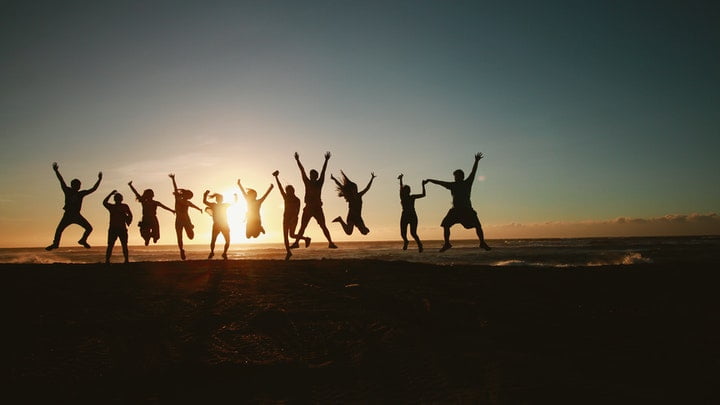Despite popular belief, blacking out after alcohol consumption is not the same as simply passing out. Loss of consciousness is not the primary aspect of a blackout, but instead the complete loss of memory even though you stay awake.
Those who experience blackouts wake up the next morning and do not remember what has happened. Even though they continued walking around and speaking to people, they will have no recollection of having done so.
Blackouts do not necessarily mean an individual cannot remember anything. These are known as complete blackouts (or en block), but it is also possible for blackouts to also involve large gaps in memory, with certain images and situations still being accessible.
What are the signs of a blackout?

Identifying when someone has blacked out from alcohol is very difficult. They can easily be identified the next day if an individual has trouble recalling their experiences, but since they act relatively normally during a blackout, spotting them at the time can be more challenging.
Although not exclusive to alcohol blackouts, some of the signs include:
- Headaches
- Muscle twitches
- Difficulty seeing things
- Slurred speech or inability to communicate
- Poor coordination and balance
Not all of these signs will be observable from an outsider’s perspective. In order to judge whether an individual might be experiencing a blackout, it is best to look out for the obvious signs and inquire as to whether headaches or vision problems might also be occurring.
Why do people black out?

Alcohol is a substance that directly influences the brain. A considerable amount increases serotonin production, bringing about the pleasurable effects of being drunk and sparking feelings of confidence and optimism.
When high volumes are consumed, however, alcohol can begin affecting an area of the brain known as the hippocampus. Known for its role in the processing of memories, alcohol can inhibit the transition of short-term memories to long-term storage, triggering blackouts.
Blackouts usually happen when the concentration of alcohol in the blood reaches 0.16% [1]. This is twice the concentration at which it is legally safe to drive, and it usually brings with it other cognitive problems with judgement, concentration, and impulse control.
What are the dangers of blacking out?

Blackouts carry several risks, and they must be considered very carefully. They impact so much more than memory, and being aware of the possible dangers can help protect an individual from hurting themselves or others.
1. Attempting unsuitable tasks
When an individual passes out from heavy drinking, it is clear and obvious that they are unable to drive or be left unattended. Blacking out, however, does not give other people the same obvious cues that alcohol levels have become so high.
Someone who has blacked out continues to appear on the outside as though they are perfectly functional. While still drunk, they can be chatty or quick-thinking, giving the people around them the notion that they are cognitively capable.
However, this is not the case. With alcohol levels in the blood being so high, individuals are not at all capable of driving a car or consenting to sex, and so they leave themselves at huge risk of accident or being taken advantage of, both of which can impact life in the long term.
2. Brain complications
Blacking out is not just about memory and how alcohol inhibits our recall. It can also delay other brain signals, particularly those which facilitate the gag reflex.
If alcohol is rejected by the stomach, an individual will feel the need to be sick. This is a normal and necessary part of the body’s process of ridding itself of toxins, but if the brain is struggling to send gag reflex signals because of alcohol, individuals can’t do this.
They might still need to vomit, but the impulse to be sick will not occur, leaving them vulnerable to choking on their vomit or suffocating. Their stomach will also not be able to rid itself of the toxins it is rejecting, prolonging the amount of time alcohol stays in the body.
3. Long-term health issues
Drinking to the point of blackout means an individual’s body is being subjected to a lot of alcohol. Over a long period of time, such exposure can start to cause problems with long-term physical and mental health.
Parts of the brain such as the frontal lobe are particularly vulnerable to this kind of damage. Responsible for several primary cognitive faculties like memory and concentration, problems with this area of the brain can lead to behaviour and personality disorders.
And physical health is impacted no less. The liver is responsible for attempting to process alcohol, but when concentrations are consistently reaching 0.16%, it can struggle to keep up. Over time, it can become damaged, increasing the risk of organ failure and cancer.
4. Blackout risk factors
Getting blackout drunk is not something which happens every time people consume high quantities of alcohol. In fact, there are various factors which increase the chance of it happening, and identifying these can help reduce risk.
Generally, the chances of blacking out due to drinking are increased when alcohol hits the bloodstream quickly. Therefore, factors which affect the rate that blood alcohol concentrations rise are those which affect the risk of blacking out [2].
These include:
- Drinking on an empty stomach
- Drinking high volumes in a short space of time
- Liver functionality (as it is responsible for processing alcohol)
- Being dehydrated before and during drinking
- Drinking when unwell
- Drinking when tired or sleep deprived
Preventing a blackout: important things to remember

Due to the many dangers and problems associated with blacking out, it is important that individuals know how best to prevent it from happening.
Even though it is incredibly difficult to keep track of how much you are drinking while under the influence, it can drastically lower the risk of blacking out if you do the following things before and during a drinking session.
- Try to keep drinking water. Consume a glass of water between each alcoholic beverage, or if that doesn’t seem doable, consume a lot of water before drinking to ensure the body is hydrated.
- Eat something before drinking. Be sure to consume a meal, and it is especially beneficial to eat something high in carbohydrates.
- Blackouts are strongly associated with binge drinking, or consuming around 4 or 5 drinks within 2 hours. If you are going to drink a lot, drink the same amount over a longer period of time to grant your body the time to process the alcohol.
If you are concerned about your uncontrollable drinking, ask a friend who is remaining sober to keep an eye on your alcohol consumption. If they understand your concerns regarding blacking out, they can step in to reduce your drinking.
You find someone who has blacked out: what to do

Blacking out does not always mean falling unconscious, but this can sometimes happen. If you find a friend who has blacked out or exhibits some of the signs outlined above, it is essential that you know how to help them.
The most important thing you can do is stay with them. If the individual is still conscious, they will have very limited mobility and cognitive ability, meaning they can seriously harm themselves or others. By staying with them, you massively reduce the risk of this happening.
In terms of helping them, you can try to sober them up. If they are able to, help them eat or drink something. This will absorb some of the alcohol in their system and reduce their intoxication.
In the event of an individual having passed out, you should place them in the recovery position. This ensures that they will not choke on their own vomit should they be sick. Also, make sure that they are breathing okay.
Should you become concerned that they are not breathing properly, or if they remain unconscious for a long period of time and will not wake, contact the emergency services and stay with them until help arrives.
Are there any misconceptions surrounding blackouts?

For some, it might be a surprise to learn that blacking out does not necessarily see individuals falling unconscious after drinking.
But what may be of interest is that this is not the only misconception surrounding the problem, there are a few other misunderstandings out there.
1. Blacked-out memories surface with time
A lot of people assume that the morning after a blackout drinking session will be followed by days and weeks of revelation. The memories will return, and they will understand what they did and how they got home – but this is actually a myth.
When blackouts happen, the hippocampus in the brain does not do the work fundamental for long-term memory creation. The brain essentially becomes a blank slate for several hours, meaning that there are no memories there to be retrieved at a later time.
2. Different drinks carry different levels of risk
Some drinks carry a reputation of being synonymous with blacking out. Tequila, for example, is widely considered to be a drink which increases an individual’s risk of losing their memories and becoming particularly inebriated.
However, this is not the case. Blackouts are triggered by high concentrations of alcohol in the blood, and the type of drink individuals consume is inconsequential compared to how much of it they consume.
3. The more you drink, the lower the risk
Drinking is often seen as something which people get better at. Those who drink regularly are seen to be capable of ‘holding their drink’, and this often comes with the misconception that these people are less vulnerable to alcohol-induced blackouts.
In reality, those who drink more regularly are only more likely to be able to conceal the fact that they have blacked out. If their blood alcohol level rises to a dangerous point, they might still be able to move and speak as normal, despite the fact they are in danger.
Regular blackouts – the signs of an addiction

If individuals blackout numerous times, it might be a sign that they are addicted to alcohol. Of course, blacking out once is not an indication of an unhealthy relationship with alcohol, but continuing to experience it is very revealing.
Blackouts are frightening. Individuals usually become unsettled when they blackout – feeling uncomfortable and disturbed by the fact that they cannot remember what happened – and they reduce their drinking in order to reduce the chance of it happening again.
However, to blackout again indicates that an individual doesn’t see the risk of it happening again to be a reason to stop drinking. Ignoring such risks is one of the biggest warning signs of substance abuse.
Am I addicted to alcohol?

If you have blacked out due to binge drinking, you might wonder whether it is a warning sign of an alcohol use disorder. Addiction has the potential to devastate physical and emotional health, so recognising other signs can help determine if a problem exists.
There is a wide range of behaviours which are associated with substance use disorders, and individuals can exhibit so many different problems and issues when they become addicted to alcohol.
However, there are a few which are most common:
- Consuming alcohol on a daily basis or multiple times a day
- Talking a lot about alcohol
- Borrowing or stealing money in order to pay for alcohol
- Ignoring the problems which arise from drinking so regularly
- Losing interest in friends or hobbies
- Not maintaining personal hygiene or appearance
OK Rehab: how we can help
Drinking alcohol is a part of mainstream culture, and tackling a drinking problem can bring with it a lot of stigma and shame. However, it is essential that those who frequently black out understand the associated risks and how they can improve their situation.
At OK Rehab, we understand that alcohol misuse problems must be tackled as quickly and efficiently as possible. Blackouts can seriously harm health, so reducing their prevalence is pivotal.
Give us a call on 0800 326 5559 and let our team give you more information and guidance on blackouts and how alcohol misuse can be treated!
References





